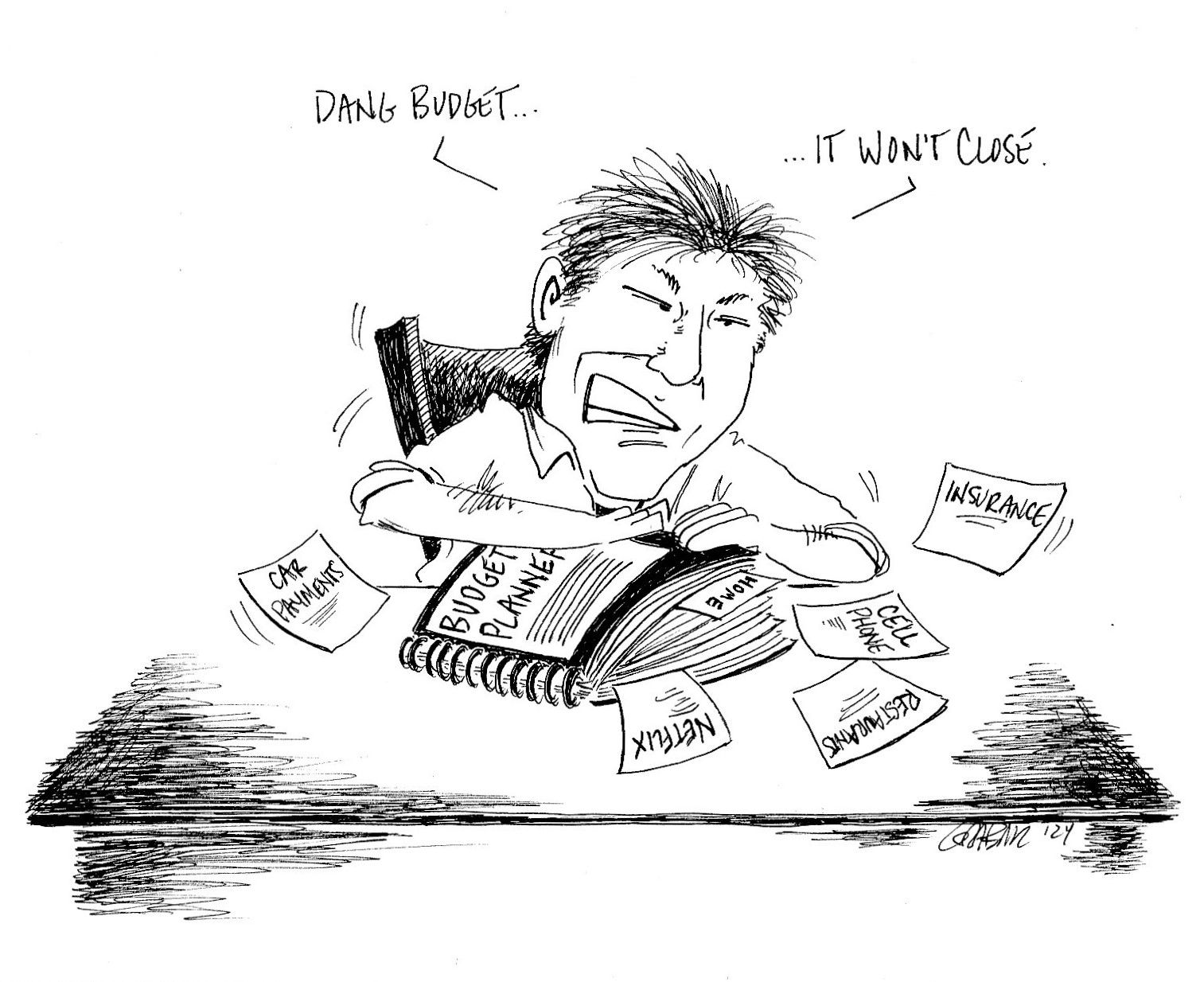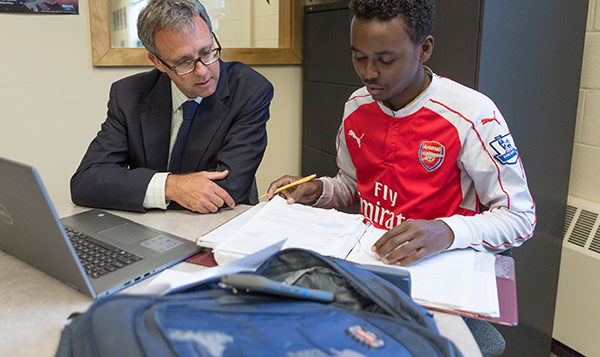We Can’t Afford the Monthly Payment Mindset

I don’t currently have a TV, and I am spending a few minutes of these TV-less days thinking about whether I want to have one again. However, I’m thinking back to when I still had a TV, and a conspicuous ad caught my ear. Yes, my ear. I was cooking, not really watching the screen, cutting veggies, and listening to Captain Picard bark out commands when I heard (paraphrasing), “I just got a new car … and I know I can afford it because it fits my monthly budget.”
Ahhhhhhh! I had to look up from my work, nearly causing an unfortunate carrot-knife-finger-slicing incident.
The ad in question was from a certain car company with a cute animal mascot and is just one in an endless line of examples showing the American marketing machine at work, making (excess) spending so easy—too easy.
We are conditioned from a young age to see costs based on monthly payments. Paying for things monthly has a place in our society and is not always a bad thing. It makes sense for mortgages, utilities, and other expenses that are incurred monthly. However, thinking we can afford something because it fits a monthly budget is at least a contributor to long-term financial stress and at most an absolute drain on our ability to build wealth and maintain financial stability.
Oh, I’ve Been There, Spent That
I have “owned” new cars; I loved them. Got my first one when I was 20, financed by my 30-hour/week grocery store job and my parents’ (co)signatures. It was a four-year loan on a Plymouth, but after just three years I saw a sporty Dodge Shadow and just had to have it. Of course, thanks to my low down payment and depreciation, I was upside down on the Plymouth—owing more than the value of the car.
“We can work with that,” the sales rep told me as he leaned on the soon-to-be mine Shadow and adjusted my sunroof. “What kind of monthly payment can you afford?”
Ah, there it is. They “rolled” my unresolved debt from Car #1 right into the loan for Car #2, added another year to the term at a slightly lower interest rate, and … it fit my monthly budget. The reality was, however, that it was a financial mistake. I couldn’t afford the car—the total cost of the car. Yet I did the same thing not three years later with new Car #3, which was a little more expensive and the loan included a little more debt “rolled” in from the last car.
I found my financial footing a full decade after Car #3, and a big part of getting things together was facing and understanding the cost of those car loan decisions. How bad? Let’s just say it was thousands in interest and depreciation. The worst part was learning that I had paid interest on the debt from Car #1 rolled into my payments on Car #2, and so on. The other worst part was when I came to understand the opportunity cost; the 5-digit actual costs in dollars could have been invested or used for education or saved to buy a future car—IN CASH!
Would a basic personal finance course in high school have helped me avoid this misstep? Who knows for sure, but I know I would have liked the chance to find out.
The Inevitable One-Hand/Other-Hand Analysis
The car payment is likely the biggest-ticket depreciating asset that we tend to cram into our monthly budget rather than looking at whether we can afford the total cost. But there are others like furniture, appliances, electronics, etc.
On one hand: Buying things based on payments gives us the ability to have things now that we can’t afford now.
On the other hand: Buying things based on payments gives us the ability to have things now that we can’t afford now.
The American Monthly Payment Mindset (AMPM—can I trademark that?) extends to mobile phones, insurance, and streaming services, just to name a few. True affordability requires looking beyond the 30-day view.
Tips and Disclaimer(s)
- Count smaller monthly items as annual expenses. For example, the average American has 4.3 streaming services at an average cost of $17 each. It’s far too easy to say, “Oh, I can sign up for QuickFlix, it’s only $17/month.” Maybe the question should be, “Hmmm…I am spending about $800/year on streaming services. Can I afford that? Can I afford thousands of dollars over five years? What else could I do with part or all of that money?”
- Analyze a car purchase based on the total cost of various options over a period of years, say seven, which is now the average term for car loans in the US. Compare new and used cars looking at that total number including expected repairs, interest, taxes, and insurance. Send me an email, please. I am happy to help with that process. I’ve crunched the numbers to dust, and I can say that buying a good used car and borrowing as little as possible always wins when it comes to the Best Financial Decision. For me, eliminating car payments from my life has been one of if not the biggest factor in turning my finances in the right direction.
- Turn the monthly payment mindset into something good—use it for savings. Cut a streaming service and start putting $17/month into an IRA or into a 529 education savings account. Try this savings calculator, watch the money grow.
- Determine what can be paid annually. My auto and home insurances are discounted by about $75 by paying in full for the year (or six months for auto). That is $75 to pay for something else or to save.
- If you are a millionaire, buy any car you want, and while you are at it, buy one for a friend.
- Business tries to make it easier for us to buy, putting the unaffordable within reach. That’s their job, maximizing stockholder wealth and all that. I get it. But our job is to spend less than we make today in order to have a better financial tomorrow.
I am not preaching; I have no right to. I’ve made the mistakes listed in this post—some more than once. I was fortunate to realize that the path I was on was draining my financial stability and my ability to build wealth. I was robbing my future self, the me of today, who has found solid ground but who has also become an expert in the “If I’d only known then…” phenomenon. I’d like to see a TV ad leave us with this thought, “I can afford this car because I sacrificed, saved my money, paid cash, and have no monthly payments.”
About the Author:
Steve has worked on financial literacy efforts in Maine since 2004, and in July 2023 he started at FAME as a Financial Education Programs Specialist. He has a B.S. in economics from Southern Connecticut State University, an MBA from the University of Hartford, and he has served as a U.S. Peace Corps Volunteer.
In the fall of 2003, he started a 20-year connection to the Waynflete School in Portland, where he taught math and personal finance, advised middle and upper school students, and coached baseball. Steve worked with students to create the Finance Club and an award-winning LifeSmarts team (Nationals 2013, 2014, and 2015). In 2011, Steve coached a Waynflete team to victory in the Boston Federal Reserve Economics Cup Challenge.
Steve was named Maine Jump$tart Financial Educator of the Year for 2012, was the keynote speaker at the Maine Jump$tart Annual Teacher Conferences in 2015 and 2023, and was Maine Jump$tart’s training coordinator from 2017 to 2023.
Steve and his family moved to Seville, Spain in July 2016 where he taught English and business English and learned many new personal finance lessons. He now lives in Portland with his wife and their son.





